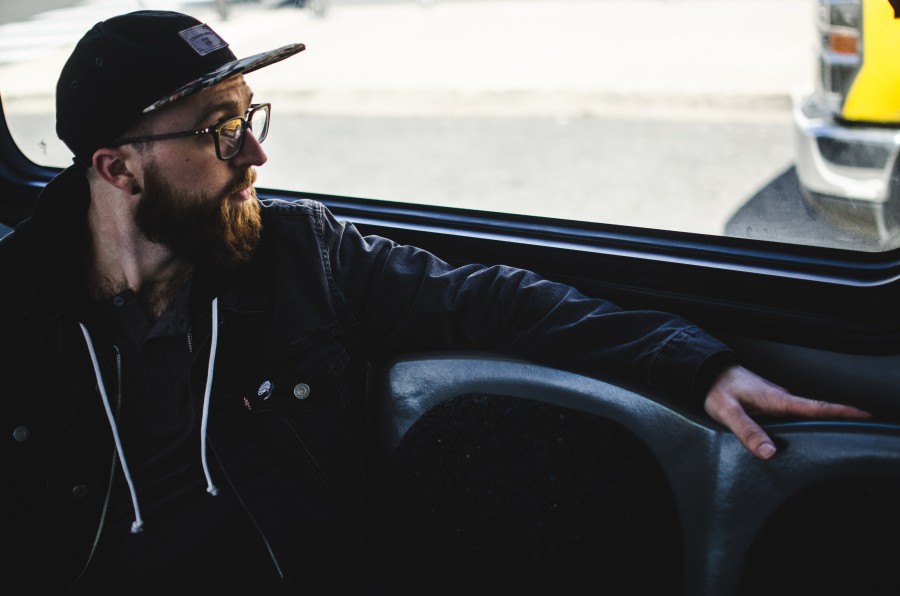One of hip-hop’s most commendable qualities is that it gives voice to a diversity of narratives. In the lyrical tradition of hip-hop, there can be dope dealers and athletes, revolutionaries and nerds — and people like Brian Raupp.
Raupp is a 27-year-old Maryland native who works as a certified arborist, having earned his degree in environmental science and policy from the University of Maryland. Both his parents have strong pedigrees in science: His mother is a science teacher and his father is renowned entomologist Michael J. Raupp, also known as “The Bug Guy.”
But Brian Raupp’s main passion in life is hip-hop. He’s a rapper who’s made the rounds at music festivals like Artscape, Epic Fest and Broccoli City, performing under the name Brain Rapp. Meanwhile, his dad makes his own rounds on CNN, PBS, The Dr. Oz Show and WAMU’s Kojo Nnamdi Show, discussing the world of insects.
Raupp says he’s inspired by his dad, as different as their ambitions may be.
“He tells me all the time, ‘When I started doing this, never in my wildest dreams would I imagine I’d be on Good Morning America or talking to Kojo about bugs.’ You don’t get into entomology to be that,” Raupp says of his father. “The parallel between the two of us and our careers now… is that I didn’t ever get into rap to be famous. … I just never thought that anybody would really want to listen to me.”
In the four years since Raupp began performing, he’s made significant headway: He’s released three full-length projects, played regional venues and gigged at the A3C Festival, a major hip-hop gathering in Atlanta. True to his background in science, Raupp’s approach to marketing himself is methodical: He realized the value of moderation early on, and now he mainly plays shows that put him in front of new eyes. (He also knows how to make a clever promotional video.)
Warning: Explicit lyrics.
Both of Raupp’s parents are supportive. Though, the elder Raupp admits that his son’s foray into rap gave him pause at first.
“Like any parent, I thought, ‘Whoa, after all this time and education, what’s up with this?’” Michael Raupp says. “I was a little concerned about the real odds that this choice could turn into a career that would allow him to pay the rent, put food on that table, and maybe have a family of his own if that is what he wanted to do,” Michael Raupp says. “But I also told him that if he had a dream, then he had to chase it.”
For Raupp, working up the courage to pursue hip-hop took time. He started writing raps at 13, but it wasn’t until he got involved with a hip-hop group at the University of Maryland called The Undergrounduates that he gained the confidence to start recording at 19.
An obvious student of hip-hop, Raupp writes cleverly candid and personal lyrics, each song exposing portions of his autobiography as he pays homage to the artists that inspired him.
On “Hello,” the opening track on his latest project Elevator Music, Raupp addresses the obvious head-on: “Hello, I’m Brain, I rap, I’m white.” It’s not a topic he shies away from, welcoming the opportunity to speak on both race and rap.
“I think it’s humbling,” Raupp says. “People lose their lives over this and I just get to feel uncomfortable because I’m the only white guy in a room — and I don’t feel uncomfortable, actually. The main thing is to always be adding to a narrative instead of trying to drive it, since that’s what white people have always done.”
Raupp attributes at least part of his racial awareness to his upbringing in Columbia, Maryland, a town created with the explicit goal of eliminating class and racial segregation. (It was here that he also met Elevator Music producer Nature Boi.)
Ultimately, Raupp hopes to build a bridge between science and hip-hop, too.
“There’s a social responsibility [that comes with] with being an artist,” Raupp says. “That’s the way I see my part.” He says his audience might not be listening to his dad on the radio or TV, so he’s happy to be the rapper who finds unique ways to talk about science. “It might not be on a record that I get to talk about the environment,” Raupp says, “but I’m going to do it.”
In a way, Raupp is still following his father’s lead.
“He had to go for it,” Michael Raupp says of his son’s hip-hop journey. “I chase my dreams and don’t have regrets.”


